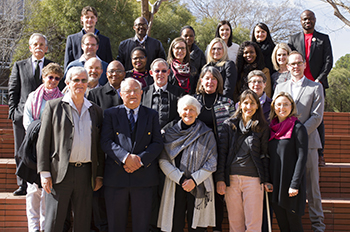Latest News Archive
Please select Category, Year, and then Month to display items
13 January 2020
|
Story Eugene Seegers
|
Photo Anja Aucamp
 Spearheading the digital expansion of the conversational Sesotho course is IDEAS Lab Director, Johann Möller (middle). With him are from the left: Prof Pule Phindane, CUT; Dr Brenton Fredericks, CUT; Bahedile Letlala, UFS Department of African Languages; and Dr Elias Malete, UFS Department of African Languages.
Spearheading the digital expansion of the conversational Sesotho course is IDEAS Lab Director, Johann Möller (middle). With him are from the left: Prof Pule Phindane, CUT; Dr Brenton Fredericks, CUT; Bahedile Letlala, UFS Department of African Languages; and Dr Elias Malete, UFS Department of African Languages.
For many years now, the UFS has been offering a one-year course in conversational Sesotho for staff members; this can then be followed up with the one-year course in advanced conversational Sesotho. The conversational Sesotho for students in the Faculty of Education was introduced in 2018 at the UFS.
The Central University of Technology (CUT) needed a conversational course for its first-year students and approached the Department of African Languages for the development of such a course. Living as we do in a multilingual country; this additional language skill opens doors and often hearts as well.
Using instructional design principles
However, the need was identified by both CUT and UFS to present this crucial information in a way that would be more appealing to digital natives as well as to those less familiar with technology. The Department of African Languages on the UFS Bloemfontein Campus, together with relevant departments from the CUT, approached the IDEAS Lab located on the UFS South Campus, since they already have a reputation for being a specialist on broadcasting and repackaging curricular content for digital presentations. The IDEAS Lab provided technical advice and built the multimedia programme, which will help the user to hear and practice phrases in Sesotho, using instructional design principles. The course will be available to both staff and students belonging to the two universities.
Room for growth
Johann Möller, Director of the IDEAS Lab, says this pilot programme will give both institutions the opportunity to test the use of multimedia for language acquisition. He adds, “Language is extremely complex, and we would like to expand this learning aid in the future.” In fact, the original design has room for growth built into it.
To keep things simple for the user and the building team, it was decided to start out with only four potential everyday scenarios where a staff member would like to speak Sesotho: Firstly, how to greet other persons from different genders; secondly, potential scenarios one might encounter in the university environment itself; thirdly, how to deal with situations at a hospital; and finally, how to use one’s language skills at a filling station.
Pronunciation is key
Each scenario contains three to four conversations that the learner can revise, along with images and audio that illustrate the situation and assist with correct pronunciation. The system does not allow the user to progress unless they have listened to the pronunciations of the sample sentences or phrases.
Further reading material and vocabulary lists are also provided, with the result that people who are using the programme can learn at their own pace. The authoring software Articulate Storyline was used to build the individual scenarios and each conversation or lesson within it. The lessons are also not dependent on an internet connection; they can be downloaded onto a flash memory drive and used offline.
Oncology department celebrates 50 years of excellence
2017-09-07

The UFS Department of Oncology celebrated 50 years of
existence. Prof Louis Goedhals says that the department
is like a family that will carry and support you.
Photo: Wendy Ruth
South Africa could see an increase of 78% in the number of cancer cases by 2030 and from a global perspective, a 75% increase is expected, increasing the total incidence of all new cancer cases from 12.7 million in 2008 to 22.2 million by 2030, according to a recent study published by medical journal Lancet. According to the Cancer Association of South Africa (CANSA), more than 100 000 South Africans are diagnosed each year. It is rather comforting that the University of the Free State’s (UFS) Faculty of Health Sciences has an Oncology department that has been fighting cancer for 50 years.
Excellence over the decades
The 50-year celebration of the Department of Oncology took place at the UFS Centenary Complex on the Bloemfontein Campus on 19 August 2017. The auspicious event was attended by UFS Faculty of Health Sciences registrars, radiation oncology radiographers and professional nurses who had trained in the department over the past 50 years, as well as the current departmental staff.
Dr Alicia Sherriff, Head of the Department of Oncology welcomed the dignitaries and thanked everyone for their attendance and dedication to the department, Prof Louis Goedhals, the oldest surviving head of department, gave a summary of the 50 years. He said once you were involved with this department you became part of a family that would carry and support you. Memories were shared and friendships rekindled. The message of this department that stood the test of time was: “To cure sometimes, to relieve often, to comfort always … and to bring hope”.
UFS dignitaries reveled in the moment
Among the special guests were the Rector and Vice Chancellor, Prof Francis Petersen, Prof Gert van Zyl, Dean of Faculty of Health Sciences; the Free State MEC for Health Mr Butana Komphela, and CEO of Universitas Hospital Dr Marcus Molokomme, were invited. The function was well attended by personnel, graduates from as far as Portugal, and dignitaries from the university. There was a sense of unity and belonging among all the attendees and enthusiastic catching up over the years that have passed.